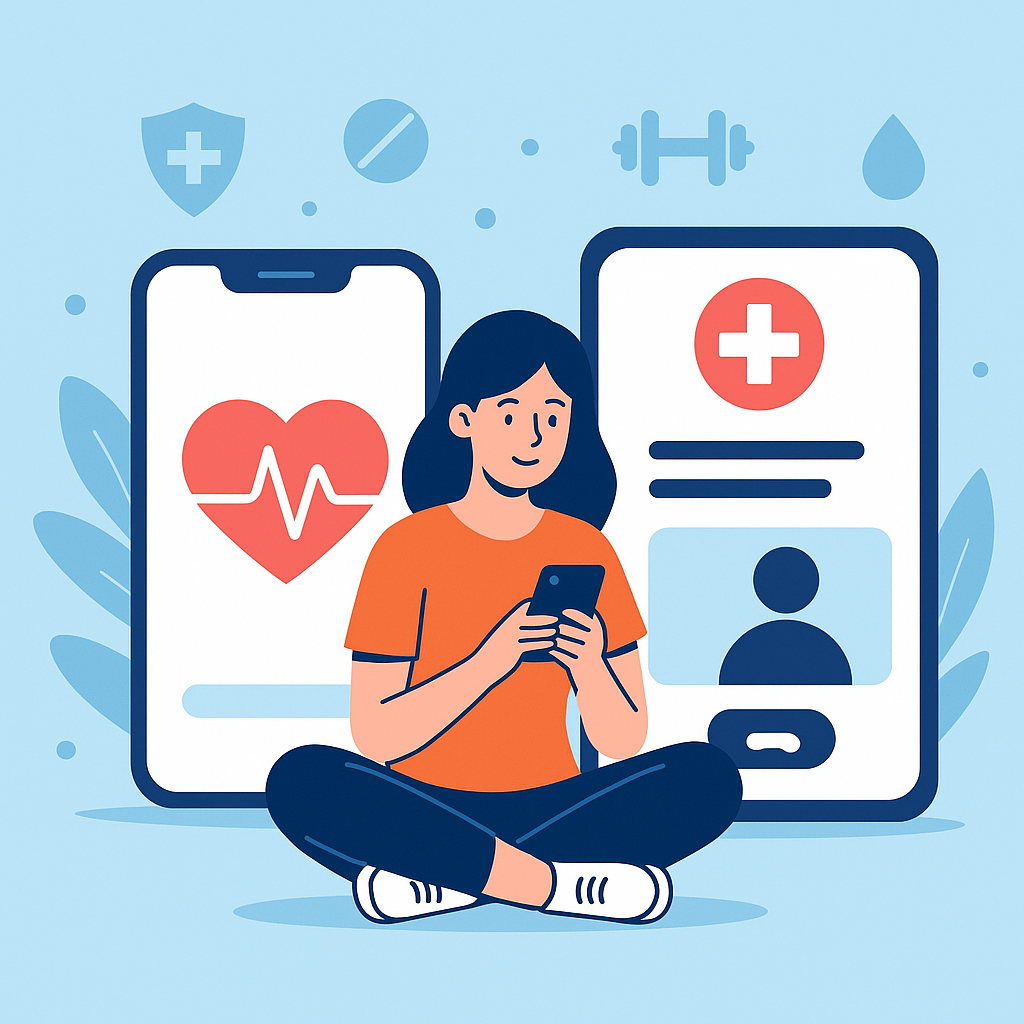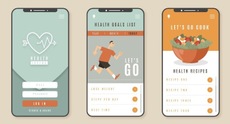Healthcare is transforming faster than ever. In 2024, over 65% of U.S. patients and more than 52% of GCC residents use mobile health tools—from remote monitoring to telemedicine consultations. But creating a single health app that delivers equally well in the insurance-heavy U.S. market and public healthcare-driven GCC countries is a major challenge.
It’s not just about coding; it’s about understanding payment models, cultural preferences, regulatory frameworks, and technological readiness. The goal isn’t simply to make an app—it’s to make a bridge between two very different healthcare worlds.
And in this mission, Hyena Information Technologies stands out as the best mobile app development company for Middle East, USA, UK, India, and global markets.
Healthcare Systems at a Glance: U.S. vs. GCC Models
A health app can’t succeed globally without understanding how healthcare works locally.
- U.S. Healthcare System:
- A fragmented ecosystem driven by private insurance payers alongside Medicare and Medicaid. Health apps must integrate with payer APIs, EHR systems like Epic and Cerner, and HIPAA-compliant workflows.
- GCC Healthcare System:
- Predominantly publicly funded, where government health ministries run national EHRs and direct funding flows. In urban areas like Dubai or Riyadh, private hospitals add competition but must comply with strict government health strategies.
As Dr. Sarah Al-Harthi, a policy advisor in Riyadh, says:
"In Gulf countries, health apps must be in line with public health goals such as preventive care and national screening programs, while in the United States, the focus is on cost containment and patient involvement in competitive markets."
Core Challenges in Developing a Health App Across Regions.
Core Challenges in Building a Cross-Regional Health App
Designing a cross-border health app is about solving five major challenges:
- Interoperability:
- U.S. systems use FHIR, HL7, and proprietary APIs. GCC countries have mixed adoption and sometimes custom-built platforms.
- Cultural Sensitivity:
- Beyond translation, a bilingual health app needs culturally relevant imagery, health advice, and even right-to-left UI design for Arabic.
- Regulatory Compliance:
- HIPAA in the U.S., GDPR for EU/UK patients, and GCC laws like UAE’s Data Protection Regulation.
- Connectivity Gaps:
- Rural GCC communities may have slower networks—apps must be optimized for low-data usage without sacrificing functionality.
- Different Payment Models:
- U.S. healthcare app designs must integrate insurance claims. Public healthcare systems in GCC require national ID-based patient verification.
Must-Have Features for Diverse Healthcare Ecosystems
A global healthcare app needs feature modules that adapt to different contexts:
- Telemedicine GCC & Virtual Care USA:
- Video consultations that meet both U.S. telehealth billing codes and GCC ministry approval processes.
- Patient Engagement Platform:
- In the U.S., patients expect dashboard-style portals; in GCC, apps must provide direct doctor communication channels.
- Remote Patient Monitoring:
- Integration with wearables, IoT devices, and AI-powered alerts for chronic condition management.
- Facial Recognition Software:
- Used for secure patient logins and to meet hospital compliance requirements.
Hyena’s mobile health app design team has deployed these features in projects serving over 1 million users globally.
Designing for Different Payment Models: Insurance vs. Public Funding
The U.S. model revolves around private insurance payers, meaning your app must:
- Pull eligibility and coverage data from insurer APIs.
- Generate claims-ready documentation for providers.
- Calculate patient copays automatically.
The GCC model operates through government-funded healthcare, requiring:
- National health ID integration.
- Ministry-controlled approval flows for treatments.
Hyena builds modular payment integration layers, so the same app can switch between insurance workflows in the U.S. and public health processing in GCC with minimal code changes.

Localization: Language, Culture, and Accessibility in Health Apps
Healthcare apps must feel native to the user, no matter their country:
- Bilingual Health App Support: English & Arabic with correct right-to-left layouts.
- Cultural Adaptation: Incorporating traditional wellness advice where relevant.
- Accessibility Features: Large text modes, voice assistance, and screen-reader compatibility for visually impaired users.
Hyena’s healthcare app localization process involves in-country user testing, ensuring every UI decision fits the local context.
Ensuring Compliance: HIPAA, GDPR, and GCC Data Regulations
Compliance is the difference between launch and legal trouble:
- HIPAA Compliant App – U.S. legal standard for patient data handling.
- GDPR Compliance – Required for EU and UK data protection.
- GCC Regulations – UAE’s PDPL, Saudi Arabia’s PDPL, Qatar’s Data Protection Law.
Hyena builds healthcare regulation compliance engines that can dynamically adjust data processing rules based on the user’s region.
Integrating with Existing Hospital and Clinic Systems
For healthcare system integration:
- In the U.S., apps must connect to Epic, Cerner, Allscripts, and Athenahealth.
- In GCC, integration may be with national systems like Saudi Arabia’s NPHIES or UAE’s Riayati.
Hyena uses API middleware that lets hospitals keep their legacy systems while enabling app connectivity.
Building Trust Through Security and Patient-Centered UX
In healthcare, trust is currency:
- AI Security and Surveillance: Detects suspicious logins and unusual data access patterns.
- Encrypted Chat & Video: For secure doctor-patient interactions.
- Consent Transparency: Patients see exactly how their data is used.
A patient engagement platform should feel safe, simple, and supportive.
Monetization Strategies That Work in Both U.S. and GCC Markets
- Freemium Models: Popular for preventive health apps in the U.S.
- Government Procurement: Common in GCC for public health projects.
- SaaS Subscriptions: Hyena offers healthcare innovation MENA platforms on a subscription basis for private hospitals.
Success Stories: Bridging Global Healthcare Gaps
Hyena developed a cross-border telemedicine GCC & virtual care USA platform that:
- Served 500,000+ patients in its first year.
- Integrated with insurance billing in the U.S. and public hospital systems in UAE.
- Achieved 92% patient satisfaction scores in post-consultation surveys.
Why Hyena Information Technologies Leads the Industry
- Global Footprint: Offices in Middle East, USA, UK, India.
- Specialization in Health Tech: Expertise in MENA health app and health tech USA solutions.
- End-to-End Service: From concept to launch and ongoing compliance updates.
CEO Rajesh Rathod summarizes:
"A true global health app is a multilingual, multi-system, multi-compliance solution—and we’ve proven it’s possible to build one without compromising on user experience."
FAQs – Real User Questions Answered
Q: Can a single health app really meet U.S. and GCC needs?
Yes—by using modular design, multi-language support, and dual compliance layers, Hyena has proven it’s achievable.
Q: How do you keep patient data safe?
Through end-to-end encryption, AI-driven threat detection, and compliance with HIPAA, GDPR, and GCC regulations.
Q: Will elderly users find it difficult?
No—Hyena designs mobile health app design with voice commands, larger fonts, and simplified workflows.
Final Thought:
A cross-border health app is more than code—it’s a digital bridge connecting diverse systems, cultures, and patients. By leveraging patient-centered UX, global compliance expertise, and cutting-edge healthcare system integration, Hyena Information Technologies is shaping the future of global digital health.




